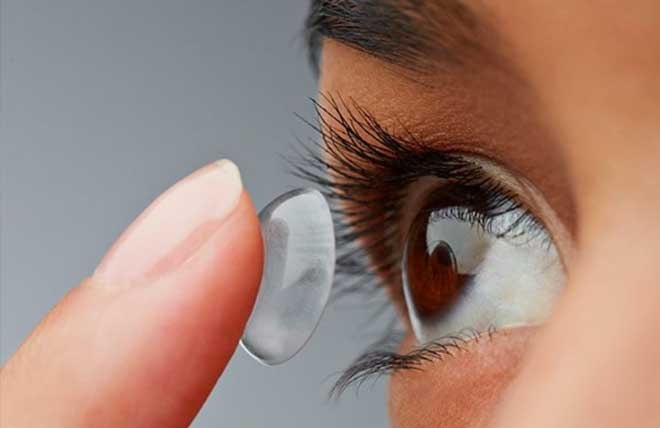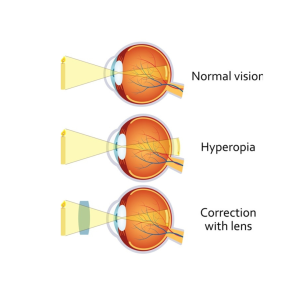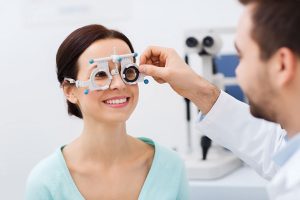
What is hyperopia?

Hyperopia is a refractive error, in which the eye does not bend or refract light appropriately to a single focus to see images clearly. The technical term for farsightedness is hyperopia. In hyperopia, distant objects look relatively clear, but close objects appear more blurred. At a very young age, people may not notice any vision problems if it is not severe. But with significant hyperopia, vision can be blurry for objects at any distance, near or far which is noticeable. Eye care professionals described it as an eye focusing disorder, not an eye disease that can be detected with proper eye exam hyperopia.
What causes hyperopia?
A flat cornea is one cause of farsightedness or hyperopia because it does not refract or bend light properly. It under-focuses the light and forms a vague image on the retina. When that happens, vision gets blurry.
A person can also be farsighted if their eyeball is shorter than normal size. This causes light to focus beyond the retina rather than on it.
In addition, a person is more likely to be farsighted if his or her parents are suffering from hyperopia.
Various complications associated with hyperopia
Farsightedness can be associated with several problems including:
Crossed eye
Some children, as well as adults with farsightedness, may develop crossed eyes. Specially designed eyeglasses that correct farsightedness may deal with this problem.
Eyestrain
Uncorrected hyperopia may cause squinting or strain in the eyes to maintain focus. This can lead to eyestrain, headaches, and severe eye problem.
Impaired safety
If you are driving a car or operating heavy equipment, an uncorrected hyperopia may pose a risk to you or/and people around you.
Symptoms of hyperopia
For people with farsightedness, his/her eyes have to work hard when looking at anything upclose which will result in eye strain. Not all people with farsighted will experience all of these problems with their vision. However, if the eye muscles have to work harder, they may develop symptoms such as-
- blurry vision, especially when looking at things that are upclose
- burning sensation on the eyes
- mild pain on the eye
- eyestrain
- headaches
- squinting
Treatment of hyperopia
Young people, especially children, can often be treated for vision problems like farsightedness because their eyes’ lenses are still flexible and adjustable. An optometrist may prescribe eyeglasses or contact lenses and for severe cases will recommend to go for surgery.
Prescription lenses
Treatment is not always necessary for farsightedness because the crystalline lenses inside the eyes are still able to adjust accordingly, enough to compensate the condition. Depending on the level of farsightedness, patients may need prescription lenses to improve their near vision. After a comprehensive eye examination, the optometrist may recommend one of these treatments to correct farsightedness depending upon the patient’s age.
Vision Space Optometrists have a variety of different ranges of eyeglasses and contact lenses that treat farsightedness or hyperopia by neutralizing the decreased curvature of the cornea or the smaller size (length) of the eye. Types of prescription lenses are as follows:
Eyeglasses

There are different types and designs of spectacle lens to correct farsightedness.
Contact lenses

Contact lenses are available in a variety of materials and designs, including soft and rigid, gas permeable in combination with spherical, toric, multifocal, and monovision designs. Experienced optometrists from Vision Space will suggest proper contact lenses that will be best for you.
Ways to prevent hyperopia

- Regular eye examination for early detection.
- Get yearly checkups if you have chronic conditions that could affect your vision (eg. Diabetic).
- If you are suffering from an ongoing eye problem, like glaucoma, follow your eye specialist treatment plan.
- Visit your optometrist if you develop vision changes or if you have eye pain, red eyes, itchiness, or eye discharge.
If you are suffering from blurry vision, squints, or get headaches when reading, talk to experienced optometrists from Vision Space. Some common simple, painless tests can determine if you’re farsighted or not. Vision Space also provides treatment options ranging from eyeglasses and various contact lenses to correct hyperopia. To know more about the eye care services and eyewear and contact lenses please visit the official website -http://www.visionspace.com.my/

